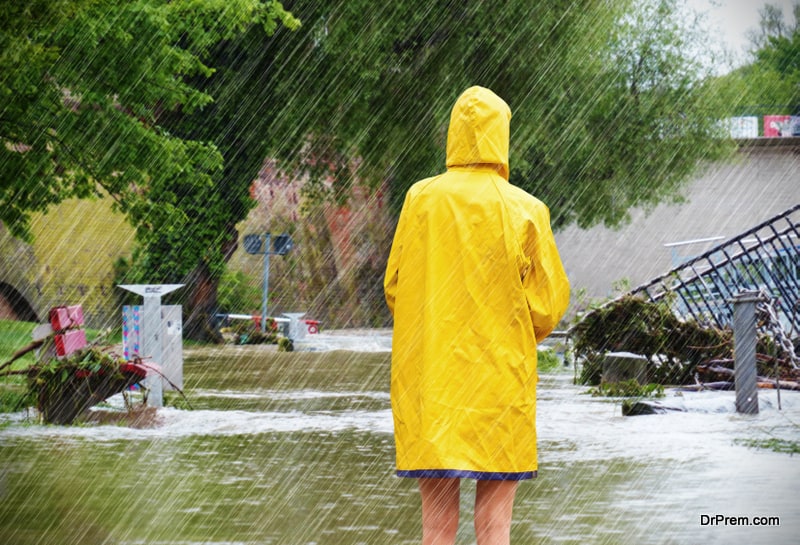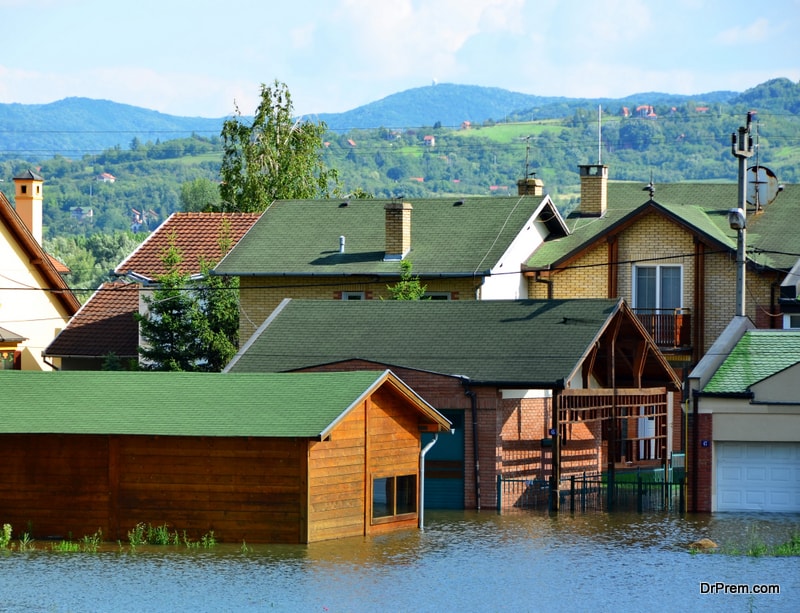Effects of climate change on mental health are perceived as a growing threat. We are obviously not talking about seasonal climate changes, here it is something connected with nature’s fury. Catastrophic weather transformations like continued heat spell and flooding could make an impact on our mental health together with physical losses.
Disease, loss of property, environmental devastation, panic, injury, extremely insecure future and death strike together. Worry about recovery from current plight takes a deep rooted dent into our minds. Words of mouth about violent climate change fuel mental distress.
A report from the American Public Health Association (APHA) states 25-50% of people exposed to extreme climate disaster are at the risk of developing mental disorders. Nearly 54% of adults and 45% of children are likely to suffer from depression after facing a natural disaster.
How many of us are aware of cyclone Katrina’s devastating effect on mental health?
Hurricane Katrina brought a horrific experience for the survivors, exceeding beyond devastation and destruction. Striving for rescue by all possible means, seeing neighbors and loved ones floating dead on flood waters and destruction of personal beings deeply scarred their minds which is never to go away easily.
- 49% of the survivors developed anxiety or mood disorder.
- 1 out of 6 survivors developed PTSD.
- Suicide events and ideation doubled.
Long term effects of climate change on mental health:
After a climate disaster, people are likely to experience diminished self-belief. They might feel difficulty in interacting with others, resulting in a reduced social interaction. They go through a common syndrome called solastalgia (loss of sense related to space, solace and security associated with the individual’s physical environment). All these result in a community impact like child abuse and domestic violence. The deep feeling of insecurity after a natural disaster manifests in the ugliest forms of human behavior.
Where sound mental health is a key to survival, natural calamity upsets it in all possible ways. Unfortunately, neither adequate redressal measures are available to attend the issue nor there is sufficient research work to establish solution routes. It is high time we stand together and fight this menace. Sweeping changes in the climate shouldn’t be allowed access to hit our mental stability below the belt.
Psychological disorders from climate change – the interrelationship:
Studies come up with some facts and numbers connecting flood and human plight. Reports throw incidents of mental disorders from 8.6 % to 53 % in first two years after flooding. Floods cause physical illness. Prolonged physical illness takes a toll on mental health too. The quality of life of survivors deteriorates, leading to mental agony.
They brood on how their lives have been changed. More the destruction of property and infrastructure, greater is the stress experienced by victims. However, there are incidents of hopes too. Community crises cement the bonding and affected people join hands to help each other. They sing and crack humor to ease the tension while giving an all out effort to thrive.
Climate change – a new form of threat assaulting our mental health:
Our brain, the master computer of all times, is facing a menace from climate change. In the face of extreme hardships imposed by climate, our mental health fails. It is for no fault of their own that the victims fall a sudden target of nature’s whims.
When extreme climate conditions take over us in a sudden furious spell, mental trauma is what we encounter. People’s lives undergo a radical change which is always along an unfavorable incline. The sufferers are subject to varying degrees of anxiety. Stress and depression become overwhelming and gradually you resign to your ill- fate. Uncertainty, loss and panic ruin you. They ravage your mental equilibrium.
Consequences of a violent and sudden climate change:
A study was launched by the US Global Change Research Program on impact of climate change on human community. The report reveals the following:
- Extreme weather conditions can induce depression, anxiety and post traumatic stress disorder. People affected by these slip into chronic psychological dysfunction.
- Not all are equally affected. The ones who are mentally not so strong and economically not so sound are the softest targets.
- Illustrations and telecast in media about climate change can also have impact on people’s reaction to stress. The same holds true if elements of climate change is brought under limelight by popular culture. It affects our thought process, triggers fears and uncertainties.
- A rapid rise in temperature and heat waves affect us both mentally and physically. Health disorder sets in extreme mental conditions like delirium. Psychoactive medications often fail to stabilize body’s temperature.
Research with a half-hearted approach:
Millions of people are mentally ravaged by natural disasters. Every aspect of their lives takes a hit. Relationships, financial stability, potential health hazards, loss of shelter, death in the family and other forms of sorrow become too much to bear. Mental stability is pushed at the threshold of collapse and beyond.
You will come across half-mad people who have lost everything to nature’s wrath. The blemish of poverty is apparent in their looks and threadbare apparel. Loss of near ones in violent climate changes has a permanent agony reflected in their eyes. Aren’t these enough to break a human being? Mental disorder and its causal determinants are yet to be explored with an honest effort.
A case in point is a publication in Nature Climate Change very recently. An online exploration of this ‘Scopus’ indexed publication referring to effects of climate change on mental health revealed discouraging results. Databases show that between 2007 and 2018 there had only been 208 notifications connecting climate change and mental torment.
Out of this meager information, only 29 cases of mental health impaired by climate change were appraised. Isn’t this a glaring example of neglect and lackluster attempt at attending to it and finding a quick and permanent fix?
Enhancement of risk:
Texts and journals from the world of science have an agreement in unison that extreme natural calamities will throw more and more people into mental despair. Future weather changes in its violent form will bring in anxiety, disease, sorrow and shock, loss of belongings, death and self immolation.
Heat waves in Australia have a similar mental impact on population as it is afflicted by loss of employment, studies show. Heat waves don’t let people get sleep at night. Fatigue sets in and mental faculties deteriorate rapidly. Worst is during heat waves psychoactive medications do not work.
A link between climate change and mental health could be established in the rising suicidal rates among Indian farmers. Extreme heat causes a drastic drop in crop production. Farmers are mentally broken visualizing a horrible future. Suicide becomes a painful escape route.
The way we are moving ahead taking minimum responsibility towards environment, rapid and furious climate change is imminent. This being said, a large section of human population is sitting on the brink of risk exposure. The chance of being pushed out of mental stability is fairly large for the coming days.
All those are impacted by climate change:
Mental disorder is bred from extreme worry and losing mental capacity to fight the most adverse conditions. Climate change affects our lives preparing breeding ground for most unfriendly challenges of life. The most likely disruptions are here:
- Destruction of crops leading to food shortages.
- Damages in public infrastructure. Transport and communication comes to a grinding halt.
- Loss of properties.
- Impairment of power grid and loss of connectivity.
- Loss of access to medical aids.
- People getting stranded in the most inhospitable conditions.
- Enforced migration where people leave their sweet home and acquaintances they have grown up with.
- Destroys places of worship, this is a deep seated mental wound for many.
The criticality of the sorry state has a chain effect. Doctors, nurses, emergency help, volunteers and NGOs are all thrown in a tumbleweed of rush. Mass confusion, panic, anxiety and despair set in fast. There are economic disruptions too. Businesses and essential commodity supply lines are blocked and people panic at the impossibility of survival without these.
Who are the worst hit group?
Scientific research reveals a link between climate change and mental health of identified vulnerable group exists disproportionately. These identified people include:
- Migrants
- Women
- Young people
- Ethnic minorities
- Poor people with economic vulnerability
The simple reason for these people being among the worst sufferers is because their capacity to resist is the minimum.
Flooding in the UK:
A study carried out by Public Health England indicated that 2000 flooding in Lewes, England has raised psychological problems four folds. The issues of mental distress among flood victims persisted for 4 years after. Primary stress was attributed to direct effects of flood like loss of property and denial of access to basic means of living. The secondary stress was traced to flood induced economic distress, insurance issues and relationship worries.
The first year of study located raised depression, disquiet and post traumatic stress disorder. Disruption of basic supplies, utilities and healthcare cause by flood left the sufferers in mental topsy-turvy. The positive side to this was the early warning delivered to affected people against mental health impact inflicted by flood. The damage was hopefully lesser.
Way forward:
Once the connection between climate change and mental health is established, some progressive thinking comes in the offing. The World Health Organization in its Comprehensive Mental Health Action Plan 2013 – 20 has put emphasis on certain requirements. There is a massive international demand for improved quality of research delving into depths of distressed mind lending support.
Research attempts are far outnumbered by unfulfilled demands. To handle complex issues like mental health and climate change as an interrelated unit a ‘ Systems thinking ‘ approach is what is needed. It takes account of the entire scenario from a bird’s eye view. Geographical, socio economic, environmental and ecological elements are to be analyzed in a common platform.
The fact that these elements are interconnected is to be understood and appreciated. Policy decisions leading to answers could be framed upon successful analysis. Like any other system, climate change and mental health feature potential, propulsion and flexibility. As a consequence, mental health impact from climate change is inevitable within some degree of leeway.
Working within the interactive premises of mental health and climate change will salvage more meaningful data to design a policy for tackling the issue. The impact of climate change on mental health has to be made public. Local, national and international communities should be involved in this exercise.
The victims should not be left to take the impact in a sudden deluge that set them in panicked confusion. The entire system, the cause and effect elements are to be identified and contingency programs to be devised.
Fortunately, it was observed that people react to a violent climate change when in group rather than when alone. This collective worry has a potential that can be leveraged against climate change damage by working suitable action programs. Similarly, it can come to the aid of improving mental health of a community struck by weather disaster.
Current risk and effects of climate shift on mental wellbeing:
The changes in climate gathering cloud in the far time horizon are too non realistic for perception at current timeline. Climate change and seasonal weather fluctuations are completely different. They are often confused as the same atmospheric phenomena making identification of abrupt climate change all the more difficult to predict.
Eminent sociologist Anthony Giddens has some thoughts on space and time barrier of climate change. This is termed as Giddens Paradox. In a nutshell, it says one should have enough foresight to predict damages done by climate change and work out survival strategies. From current point of time, these climate changes are separated by time and distance barrier. Hence it is not prudent to wait until they fall on you unexpectedly ruining your life.
Acknowledging interrelationship between mental health and climate change:
It is imperative we acknowledge the connection between climate change and mental health soon. It is our mental stability that is hard hit by nature’s anger so maintaining our core strong is the key to pull through. A damaged mental health shrinks our cognitive capabilities.
At the hour of crises, we need to do a lot of fast mental work under huge pressure and uncertainties. So it is wise to perceive the link between mind and nature and be prepared for any disastrous cross roads. Our minds should not betray us in those hours of need. We should train it accordingly.











